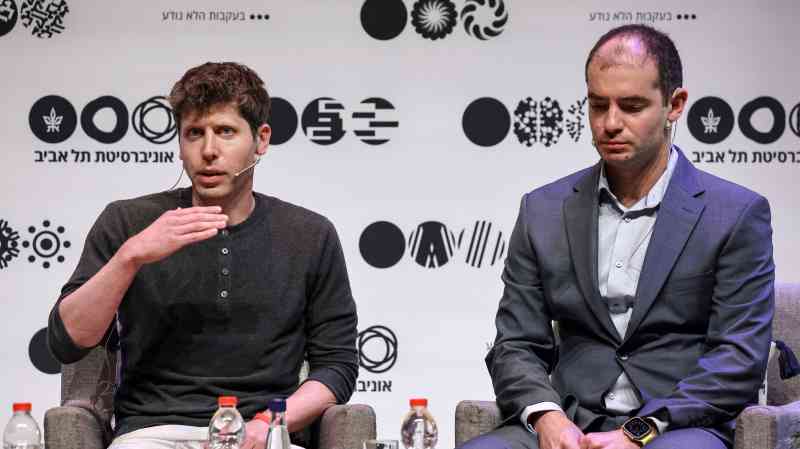‘We students are finding ways to fight back against AI interviews’
In the past three months, in my final year at a Russell Group university studying business management, I’ve applied for 50 jobs in finance — filling out forms in between lectures, dissertation research and pulling all-nighters to hit the word count for coursework essays.
The job market today looks nothing like it did for graduates even a few years ago. Applications to the country’s top employers jumped by almost a third in 2023 on the previous year, according to the Graduate Market in 2024 report from High Fliers Research. For banking and finance, employers typically receive 90-100 applications per job space, so 99 per cent of applicants are being turned down.
AI is now the preferred method for blue-chip companies to cut down the barrage of résumés they receive each year. Sifting through the thousands of CVs is just too impractical for some companies, so the application process has had to adapt, and certainly not to support students.
• ‘I had to beg to go into the office’: is the grad scheme dead?
Gone are the days of uploading a CV and cover letter outlining your motivations for wanting to join a company. Those seeking to start out in finance in 2024 will face up to six rounds of assessments, the first three conducted by AI, and students are finding ways to fight back.
I’ll take you through it. The first step seems harmless enough: modify your CV into the company’s format, designed for AI to easily comb the data and pull out key phrases such as “society president” while dismissing people with mediocre grades. Swots with extensive work experience will understand the pain of individually entering a CV into slow and user-unfriendly systems. Granted, it’s not that annoying the first time but by the 50th application you are longing for the rose-tinted days of attaching a document to an email.
The aim of round one is to get past the AI gatekeeper. I’m aware that the personal information I give is going to allow AI systems to categorise me, especially as affirmative action is so central to male-heavy finance firms. So I have resorted to selecting “prefer not to say” about my gender to avoid being culled. It feels weird and not great to admit it, but a lot of my friends are doing the same thing. I am not trying to make a political point, but as a white, straight, state school-educated male I am among the largest demographic applying for these highly competitive jobs. The impact of diversity drives within the graduate sector is difficult to gauge on an individual level, but as small margins make a big difference, I prefer to know that I am being judged only by my achievements and not my demographic attributes.
The second stage has become standardised across many blue-chip companies: a two-hour online numerical and personality questionnaire. Designed to identify a candidate’s strengths and weaknesses, these tests are generally provided by an external company that services most of the industry. This means students are effectively sitting the same test over and over. Filling out a form with such questions as “On a scale of 1-10 how likely are you to stay at work until a task is complete?” gives a pretty clear indicator of what companies are looking for. It would be pointless to admit to anything other than a “money never sleeps” work ethic. The midweek five-a-side evening football game that I secretly see myself taking up gets no mention in this round.
Pass round two and you’re progressed to a virtual video interview with a robot. Scenarios and interview questions are presented to the interviewee. After preparation time of two minutes, you record your responses as if you are speaking to a real person. AI language systems are designed to analyse key phrases and general expressions to rank candidates and decide who progresses. Students have been quick to exploit this stage by producing huge documents with “ideal” answers to hundreds of possible questions, all designed to maximise their chances. My university even has a society dedicated to developing techniques to beat AI-assessed interviews. Companies are no longer assessing a candidate but a manipulated and tailored bank of ideal interview answers.
It is not unusual not to hear back for at least a month after an interview. I file away my frustration over the hours I’ve already committed along with my actual progress on an Excel spreadsheet tracking my applications, almost all of which are in a state of “waiting to hear back”.
• I applied for a job using AI. Did I get an interview?
By round four, a company will engage in more traditional interviews. The golden stages, as I like to call them, can include phone calls, assessment centres and individual interviews. I say “golden” because I feel as if this is where I can shine. It is also the first opportunity to experience the firm’s culture and work ethos, so I can gauge whether I can see myself working there. When completing identical online applications for companies, it’s easy to forget that I am also looking for a company where I want to work. According to the UK Graduate Careers survey, 84 per cent of those applying for graduate jobs believe it’s unfair for employers to use AI to assess these interviews, rather than a graduate recruiter — yet we have little choice but to go along with it.
Pass those phone call rounds, as I have a few times, and you’ll find yourself leaving your dingy university bedroom bound for a pristine marbled lobby in the City along with the other lucky few who have made it this far, plenty of whom seem to be international students.
Weeks later comes the bland, computer-generated rejection letter: “We regret to inform you …”
Back to the start for me, and many like me. The abundance of graduates competing for the limited number of positions while the country deals with a recession and uncertain political environment is placing serious pressure on students. Beyond that I can only speculate as to why it is especially bad for graduates now: there are record numbers of international students coming to the UK and seeking to work after study. Plus, the value of an undergraduate degree has been eroded by the increase in postgraduate numbers chasing the same positions.
My friend went through 80 job applications, each with AI rounds, before finally getting on the grad scheme at Barclays. I have recently decided to pursue other opportunities, even though my childhood dream was to follow my dad and working in London. I want an opportunity where I can explore my creativity, build practical skills and create an environment that inspires me to succeed. I’m thinking of moving abroad.




Post Comment